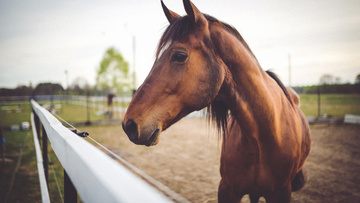Choking in horses is a common problem that every horse owner should be ready to handle. While it is not the same as choking in humans, it still needs immediate attention. Let’s identify signs of choking in horses, what causes it, and the best ways to manage and prevent it.
What Is Choking in Horses?

Choking in horses occurs when hay, grain, or another object gets stuck in the esophagus and can’t reach the stomach. Unlike choking in humans, choking in horses doesn’t block the airway, so the horse can still breathe.
However, choking is still a medical emergency because it can cause serious complications if it lasts too long. These include pneumonia, dehydration, or damage to the esophagus.
What Causes Choking in Horses?
Here are common reasons why horses may choke:
- Poor dental health: Horses with uneven or damaged teeth may struggle to chew food properly, increasing the risk of choking.
- Eating too quickly: Horses that eat fast often swallow food without chewing enough.
- Dry feed: Pellets, hay cubes, or beet pulp can swell in the esophagus if not soaked before feeding.
- Foreign objects: Horses may swallow non-food items, such as twigs, plastic, or even baling twine. These can get stuck in the esophagus.
Signs of Choking in Horses
Recognizing the symptoms of choking in horses is crucial for quick intervention. Here are some of the most common signs:
- Difficulty swallowing or chewing
- Excessive salivation
- Food or water coming out of the nostrils
- Gagging
- Stretching the neck in discomfort
- Restlessness or signs of distress
- Coughing, particularly when eating or drinking
If your horse shows any of these signs, act quickly. Sometimes, choking clears up on its own, but if it lasts too long, it can cause serious problems.
What to Do If Your Horse is Choking?
If you suspect your horse is choking, stay calm. Horses can sense stress, and staying calm helps them from getting overly anxious. Then, remove access to food and water, as allowing the horse to eat or drink can worsen the blockage. It’s also important to encourage relaxation. Lightly walking your horse can help them relax and prevent further distress. While some mild cases of choking may clear up on its own, it’s always best to contact your veterinarian.
When to Call the Vet?
Some chokes can be resolved on their own. You should call a vet if the choke lasts more than 30 minutes or if your horse seems more distressed. You should also call the vet if food or water comes out of their nostrils or if they keep coughing or showing discomfort after the blockage clears.
When the vet arrives, they will likely sedate the horse to relax the esophagus. They will likely use a nasogastric tube to remove the blockage. In severe or repeated cases, the vet might do more tests, like an endoscopy, to check for esophageal damage.
Preventing Choke in Horses
Taking proactive steps can significantly reduce the risk of choking in horses. Here are some important prevention strategies:
- Routine dental care: Schedule routine dental exams to ensure your horse can chew effectively.
- Thorough feeding practices: Soak dry feeds like pellets, beet pulp, or hay cubes to soften them. Also, use slow-feeder hay nets or place large rocks in grain buckets to slow down fast eaters.
- Monitor feeding behavior: Observe your horse during meals to ensure they’re chewing properly.
- Provide fresh water: Staying hydrated is important for digestion and helps prevent food from getting lodged in the esophagus.
Choke Complications
After a choking episode, monitor your horse closely for complications. One common issue is aspiration pneumonia. Signs include coughing, fever, nasal discharge, and difficulty breathing. Also, check for problems like difficulty swallowing, discomfort, or a refusal to eat, as these could mean esophageal damage. If you notice any of these signs, contact your vet right away.
Remember, choking in horses is a manageable condition if recognized and treated promptly. Recognize the signs, act fast, and use preventive measures to keep your horse safe. Regular dental care, proper feeding practices, and a vigilant eye can make all the difference in keeping your horse healthy and happy!






















